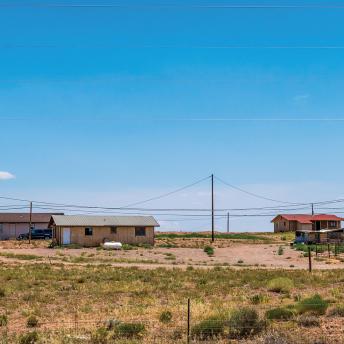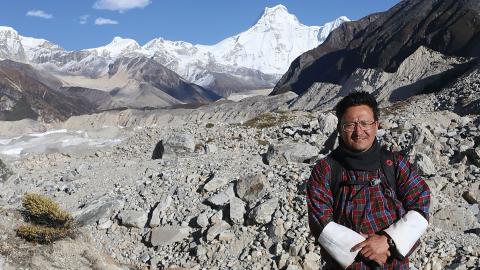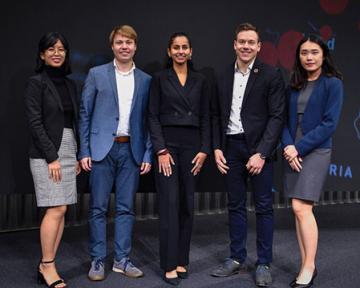
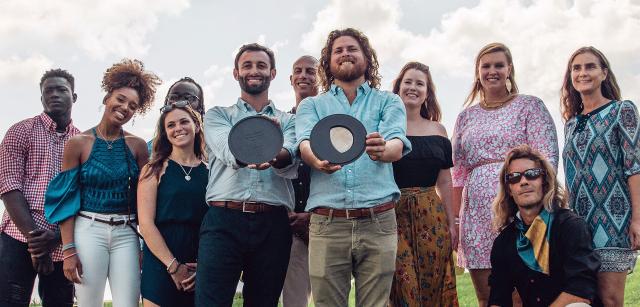
Sam Teicher and Gator Halpern (center) founded the Bahamas-based Coral Vita, which aims to rapidly grow coral species that are resilient to changing ocean conditions. Photo: Harry Lee
Coral Vita Wins Earthshot Prize
Coral Vita, the world’s first commercial land-based coral farming company for reef restoration founded by Sam Teicher ’15 MEM and Gator Halpern ’15 MEM, was named a winner of the inaugural Earthshot Prize. The startup was one of five winners of the £1 million grand prize awarded by Prince William, Duke of Cambridge, who established the global environmental competition to provide financial backing to scale up innovative solutions to the climate crisis.
“It’s the honor of our lives to have Coral Vita’s work and the global fight to protect coral reefs uplifted by winning the Earthshot Prize,” says Teicher. “We look forward to scaling our efforts around the world and collaborating with local communities, scientists, governments, the private sector, and innovators to protect the ecosystems that sustain us all.”
Bahamas-based Coral Vita aims to grow coral species that are resilient to changing ocean conditions — at a rate up to 50 times faster than traditional growing methods. The company believes its methods could potentially supply coral for an entire country with just a single farm and envisions the Earthshot Prize jump-starting this effort to rebuild reefs around the world.
Teicher and Halpern arrived at YSE with experience in marine biology and launched Coral Vita as students using seed funding from the Tsai Center for Innovative Thinking at Yale as well as funding from the Center for Business and the Environment at Yale. They have since won numerous prizes and plaudits for their work, including recognition from the XPRIZE Ocean Initiative, the Forbes 30 Under 30 list, and the U.N. Young Champions of the Earth Prize.
The five Earthshot winners were chosen from three nominees in five categories. Another nominee, Restor, was founded by former YSE postdoctoral fellow Thomas Crowther and is headed by CEO Clara Rowe ’15 MEM.
New Horizons Conference
Panels covered a range of topics, including energy justice, food justice, land rights and reparations, disaster and resilience, environmental enforcement, environmental quality, and just transitions.
For the second straight year, YSE hosted the New Horizons in Conservation Conference, an annual gathering of students and early-career professionals who are historically underrepresented in the environmental field and/or committed to diversity, equity, and inclusion in the field. The conference is organized by the Justice, Equity, Diversity, and Sustainability Initiative.
Panels covered a range of topics, including energy justice, food justice, land rights and reparations, disaster and resilience, environmental enforcement, environmental quality, and just transitions. Speakers included Brenda Mallory, chair of the Council on Environmental Quality in the Biden administration; Frances Beinecke ’71 BA, ’74 MFS, former president of the Natural Resources Defense Council; and Ebony Martin, co-executive director of Greenpeace USA.
“There is so much work to be done” on environmental justice, said Dr. Dorceta Taylor, who serves as senior associate dean of diversity, equity, and inclusion and professor of environmental justice at YSE. Taylor, who established New Horizons, opened the conference with findings from her ongoing research on issues of diversity and compensation among leadership in environmental organizations.
Crop Byproduct App Nabs Geneva Challenge Top Prize

A team led by YSE students Veenu King ’22 MEM, Elaine Lac ’22 MEM, and Maximilian Schubert ’22 MEM won the Geneva Institute’s 2021 Geneva Challenge for creating an app that helps farmers find viable alternatives to burning harvest byproducts.
The app, called BuyBy, acts as a centralized marketplace that connects farmers with buyers who can use crop byproducts for inputs into sustainable textiles, pulp and paper, dyes, and biofuel. The concept is based on principles of the circular economy and industrial symbiosis, where waste products are reused and become valuable commodities in the marketplace.
The app currently focuses on the Punjab region of India — where emissions from the burning of byproducts accounts for 40% of New Delhi’s air pollution — but the students say the model is designed to be replicated and scalable.
“This project and the experience itself gave us validation of our ability to be entrepreneurial and that our solution is necessary and innovative,” King says.
Father of Green Chemistry Awarded Prestigious Volvo Prize
“Generations both alive and yet unborn have him to thank for prodigious amounts of toxins not created, pollution not released, resources not wasted, and cleanup costs not incurred as chemistry enriches our lives — now, thanks to him, far more thoughtfully and harmoniously with all life.”
co-founder and chair emeritus of the Rocky Mountain Institute
Paul Anastas, Teresa and H. John Heinz III Professor in the Practice of Chemistry for the Environment, was awarded the 2021 Volvo Environment Prize in recognition of the transformative impact of his work across numerous sectors and industries.
Anastas is considered the founder of the field of green chemistry — the design of products and processes to reduce or eliminate the use and generation of hazardous substances.
“Generations both alive and yet unborn have him to thank for prodigious amounts of toxins not created, pollution not released, resources not wasted, and cleanup costs not incurred as chemistry enriches our lives — now, thanks to him, far more thoughtfully and harmoniously with all life,” said Amory Lovins, co-founder and chair emeritus of the Rocky Mountain Institute.
Anastas headed the research program at the Environmental Protection Agency from 2009 to 2012, and his career includes stints at the White House Office of Science and Technology Policy and the American Chemical Society’s Green Chemistry Institute, which he founded in 1997. He is the co-founder and director of the Center for Green Chemistry & Green Engineering at Yale.

Helping Cities Protect Their Urban Parks
YSE is partnering with the Central Park Conservancy and the New York City-based Natural Areas Conservancy in a new initiative to study the on-the-ground impacts of climate change on urban parks. The goal of the initiative, called the Central Park Climate Lab, is to work with cities across the U.S. to advance and implement urban park strategies to mitigate and adapt to climate change and understand how these essential greenspaces could be used to create more resilient futures.
“Parks are essential for New Yorkers, as this last couple of years have proven, but flooding, high winds, and extreme temperatures pose a threat to their health,” says New York City Mayor Eric Adams. “The Central Park Climate Lab begins a new era in research and cooperation that will give our park professionals improved tools to combat the climate crisis, and it will be a model for urban parks across the country.”
The initiative will include YSE Professors Karen Seto and Mark Bradford as well as Sarah Charlop-Powers ’09 MEM and Clara Pregitzer ’20 PhD from the Natural Areas Conservancy.
Leadership Council 2022
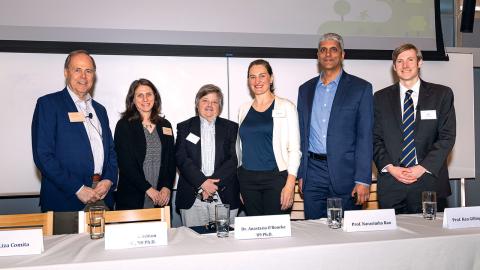
The faculty panel provided a succinct overview of important work underway at YSE.
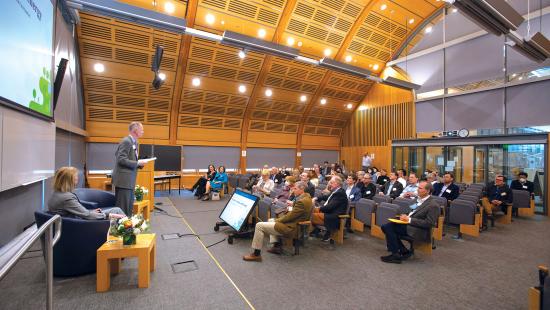
YSE’s Leadership Council returned to Kroon Hall April 21–22 for its first in-person meeting since 2019, with several members joining virtually as well. Presentations focused on exciting work underway at YSE in forests, carbon capture, equitable energy transition, and the potential of cities to drive climate solutions.
Yale President Peter Salovey joined the Council for remarks and a Q&A, during which he described YSE’s leadership role in the University’s new Planetary Solutions Project. Council members were delighted to spend time networking with each other, YSE’s professors, and students during meals and engaging breakout sessions.
“It was wonderfully stimulating to be back together in person, gathering mutual inspiration from the many ways in which the YSE community is contributing solutions to climate change and other environmental challenges,” Dean Burke said.

